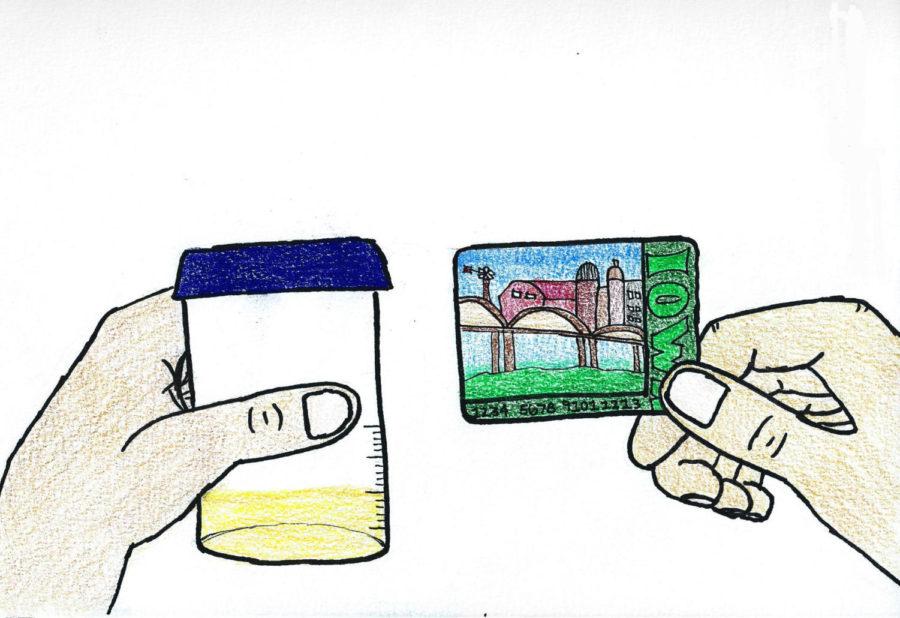Woods: Make drug testing mandatory for Supplemental Nutrition Assistance Program
The Supplemental Nutrition Assistance Program is used and depended on by millions of Americans. Some of the people receiving the aid trade or sell their food stamps for drugs. Making recipients take a drug test before receiving the aid would help eliminate these unintended consequences.
December 12, 2014
Recent history has shown that growing portions of the American people have become dependent on the government, unable to stand on their own two feet.
These Americans, usually close to the end of the economic line, take handouts from the government like the Supplemental Nutrition Assistance Program.
This is dangerous, especially when occurrences like selling or trading food stamps for drugs take place.
“When individuals with drug convictions are denied food stamps and cash benefits, establishing economic stability upon reentry becomes more difficult, and it becomes more likely that they may return to criminal activity and drug use instead of maintaining sobriety and obtaining gainful employment,” said Elizabeth Farid, deputy director of the Legal Action Center’s National HIRE, Helping Individuals with criminal records Reenter through Employment, Network in an article written by America’s Wire.
This is the exact reason drug testing needs to be enforced for those participating in the Supplemental Nutrition Assistance Program.
“America is increasingly moving away from a nation of self-reliant individuals, where civil society flourishes, toward a nation of individuals less inclined to practicing self-reliance and personal responsibility. Government programs not only crowd out civil society, but too frequently trap individuals and families in long-term dependence, leaving them incapable of escaping their condition for generations to come. Rebuilding civil society can rescue these individuals from the government dependence trap,” according to the 2013 Index of Dependence on Government.
The supplemental nutrition assistance program aids low-income households in paying for food. The amount of supplemental nutrition assistance program food stamps a household gets depends on the household’s size, income, and expenses, which is determined by the federal government and is adjusted annually.
It’s sad to think that 47 million Americans cannot support themselves and have to rely on the government for as simple, necessary items such as food. However, it is also sad that such large portions of Americans participate in these programs take the opportunity to use the food stamps as bargaining chips for drugs.
Approximately 12 percent of the federal budget in 2013, or $398 billion in taxes, was spent supporting programs that provide aid to individuals and families facing hardship.
The supplemental nutrition assistance program is included in these Safety Net Programs funded by the federal government, according to the Center on Budget and Policy Priorities.
Notice the words “safety net” can become all too comfortable for some Americans taking advantage of Supplemental Nutrition Assistance Program. Apply for government aid and use the benefits of the program for needs other than what it was intended for, what a perfect set up.
I’m sure not every American uses this program properly, but not each person is abusing it either. However, that doesn’t detract from the fact that more than 41 percent of the population relies on government assistance programs, according to the Heritage Foundation.
So far, there have been several states that have applied this stipulation to their Supplemental Nutrition Assistance Program requirements.
In 2010, at least 12 states submitted proposals to legislation. None of these proposals became law because most of the legislation was focused on “suspicionless” or “random” drug testing, which is at odds with a 2003 Michigan Court of Appeals case. Marchwinski v. Howard ruled that subjecting each welfare applicant in Michigan to a drug test without reason to believe that drugs were being used, was unconstitutional.
However, proposals gained momentum again beginning in the 2011 session. Since then, Oklahoma, Tennessee, Georgia, Utah, North Carolina, Kansas, Mississippi and Alabama have incorporated some form of drug testing requirement for government programs.
Drug testing is required for some 84 percent of jobs in America, according to Society for Human Resource Management. If it is a requirement for those who are able to support themselves, it should be a requirement for those who cannot.
Having the stipulation of a drug test would not only help families who are struggling with drug issues, but the Americans who are spending precious tax money to fund these programs can be assured that their money is being given to those who need it and are not abusing it.
There would be obvious difficulties regarding enforcement of the new drug policies, at least initially. However, the potential benefits of correcting the flawed system far outweigh all negative aspects of enforcing drug testing policies.







